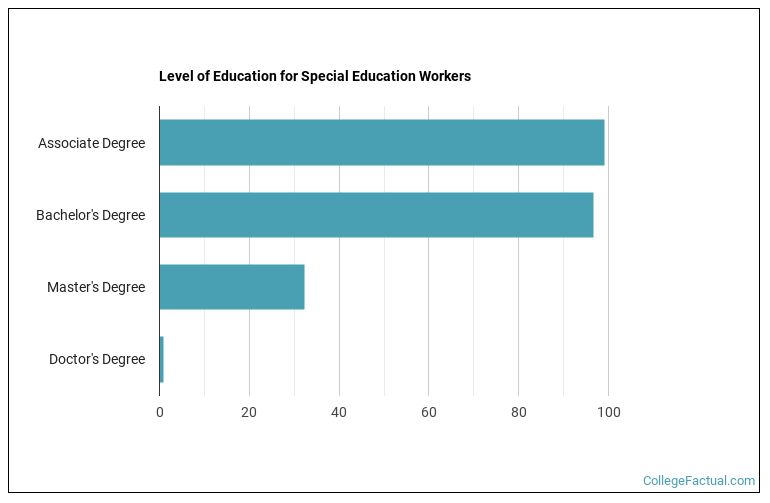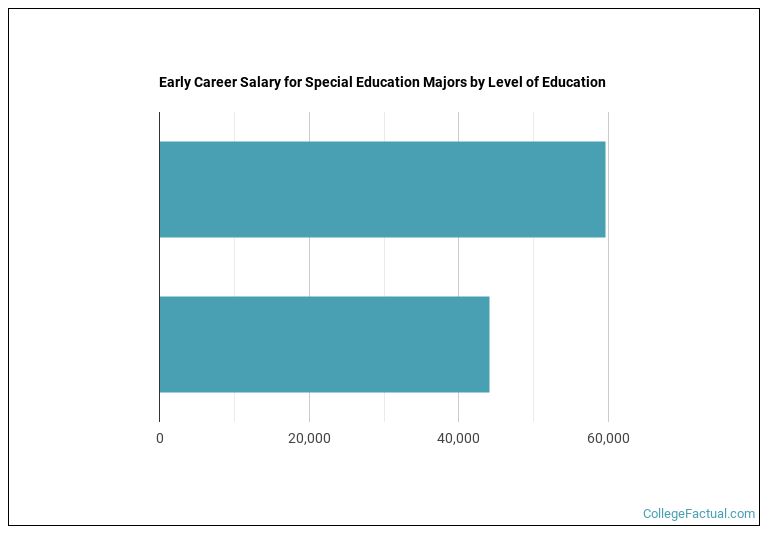 by our College Data Analytics Team
by our College Data Analytics TeamBrittany has Down syndrome and is in a special contained classroom. With the help of her teacher, Brittany learns many life skills that will help her live a happy and less dependent life.
Eric is autistic and has a hard time socializing. After several weeks, Eric is able to work better with his classmates because of the teaching aid and the teacher working together to modify instruction.
These are just a few examples of what Special Education teachers do every day. A major in Special Education focuses on designing educational services and teaching children with learning needs or disabilities. You will create individualized learning plans (IEP) and monitor your student's progress while also supporting each student emotionally and making sure that their needs are met. Your students will have a wide range of learning, mental, emotional, and physical disabilities.
Some classes you could be required to take are behavior management, assistive technology, human development and learning, cultural and linguistic diversity, issues in special populations, issues in contemporary education, mild to moderate disabilities, moderate to severe disabilities, and assessment in special education.
There are many different concentrations within special education. In your major you can focus on hearing or vision impairment, gifted and talented education, emotional disturbances, multiple disabilities, orthopedic and other physical impairments, speech impairment, autism, developmental delays, brain trauma, and more.
In 2021-2022, special education was the 29th most popular major nationwide with 35,973 degrees awarded. This year's Best Special Education Schools ranking compares 353 of them to identify the best overall programs in the country. Continue reading to check out one of our many unbiased rankings of special ed programs later in this article.
As a special education teacher there are certain skills needed in order to have a successful career. You need to be patient and willing to put in extra work and effort. Students with special needs usually require more patience and attention in certain areas depending on their individual needs. Although Special Education teachers are patient and understanding, they must also be assertive in advocating for students to receive the services and support they need. A good sense of humor will be very helpful in this field as well as being able to enjoy small successes. It will help you to be inclusive and celebratory of differences.
This field required you to have excellent interpersonal skills as you will be working with students, as well as other teachers, parents, administrators, and teacher aids. Teachers become heavily invested in the success of their students; you need to be able to persevere through difficult moments in order to achieve the happiness and growth of your student.
In order to become certified, you will need to complete a teacher certification program at your college. This program will prepare you for teaching as well put you in a classroom with a certified teacher to student teach. Along with student teaching, it is a good idea to work as a camp counselor, a coach, or even a tutor with special-needs students to help gain experience.
special education degree applicants generally need have finished high school or their GED. Many schools may also have GPA and SAT/ACT score minimums that must be met. In addition to these basic special education program qualifications, to serve in some special ed careers, special certification may be required outside of your degree.
Special Ed degree levels vary. You can get anything from a in special education to the highest special ed degree, a . The type of special ed degree you choose will determine how long it takes to get your diploma.
| Degree | Credit Requirements | Typical Program Length |
|---|---|---|
| Associate Degree | 60-70 credits | 2 years |
| Bachelor’s Degree | 120 credits | 4 years |
| Master’s Degree | 50-70 credits | 1-3 years |
| Doctorate | Program required coursework including thesis or dissertation | At least 4 years |
A bachelor's degree is the most common level of education achieved by those in careers related to special ed, with approximately 50.4% of workers getting one. Find out other typical degree levels for special ed workers below.
| Level of Education | Percentage of Workers |
|---|---|
| Bachelor’s Degree | 52.9% |
| Master’s Degree | 27.0% |
| Post-Baccalaureate Certificate | 13.8% |
| Post-Master’s Certificate | 2.2% |
| Associate’s Degree (or other 2-year degree) | 1.8% |
Most workers in special ed have at least a bachelor's degree. The chart below shows what degree level those who work in special education have obtained.

The education level required is different depending on the special ed career you are seeking.
Special Education teachers can work with a variety of students with different needs. There is a high demand for special education teachers in public and private schools. The growth seems to be mainly for students in kindergarten, elementary, and middle schools because students are getting diagnosed at earlier ages.
Want a job when you graduate with your special ed degree? Special Education careers are expected to grow 9.0% between 2016 and 2026.
The following options are some of the most in-demand careers related to special education.
| Occupation Name | Projected Jobs | Expected Growth |
|---|---|---|
| Kindergarten or Elementary School Special Education Teachers | 202,800 | 7.4% |
| Special Education Professors | 141,600 | 7.4% |
| Middle School Special Education Teachers | 95,700 | 7.2% |
| Interpreters and Translators | 80,300 | 17.7% |
| Special Education Teachers | 45,400 | 9.9% |
Recently graduated special education students earned an average of $54,770 in <nil>. Earnings can range from as low as $9,503 to as high as $84,996. As you might expect, salaries for special ed graduates vary depending on the level of education that was acquired.

Salaries for special education graduates can vary widely by the occupation you choose as well. The following table shows the top highest paying careers special ed grads often go into.
| Occupation Name | Median Average Salary |
|---|---|
| Special Education Professors | $65,320 |
| Middle School Special Education Teachers | $64,390 |
| Kindergarten or Elementary School Special Education Teachers | $63,110 |
| Special Education Teachers | $62,500 |
| Special Education Preschool Teachers | $61,610 |
With over 2,726 different special ed degree programs to choose from, finding the best fit for you can be a challenge. Fortunately you have come to the right place. We have analyzed all of these schools to come up with hundreds of unbiased special ed school rankings to help you with this.
One of 14 majors within the Education area of study, Special Education has other similar majors worth exploring.
| Major | Annual Graduates |
|---|---|
| General Special Education | 23,838 |
| Education/Teaching of Individuals in Early Childhood Special Education Programs | 3,451 |
| Elementary Special Education | 1,665 |
| Education/Teaching of Individuals with Multiple Disabilities | 1,514 |
| Other Special Education & Teaching | 1,296 |
| Related Major | Annual Graduates |
|---|---|
| Teacher Education Grade Specific | 110,770 |
| Educational Administration | 46,975 |
| Teacher Education Subject Specific | 42,343 |
| General Education | 29,389 |
| Curriculum & Instruction | 19,217 |
Image Credit: By woodleywonderworks under License More about our data sources and methodologies.